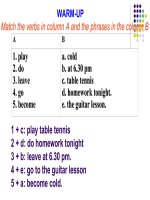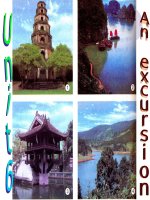Unit 4 language focus
Bạn đang xem bản rút gọn của tài liệu. Xem và tải ngay bản đầy đủ của tài liệu tại đây (558.93 KB, 14 trang )
<span class='text_page_counter'>(1)</span><div class='page_container' data-page=1></div>
<span class='text_page_counter'>(2)</span><div class='page_container' data-page=2>
<b>general</b>
<b>primary</b>
<b>secondary</b>
<b>September</b>
<b>/ ʤenərəl </b>
<b>/</b>
<b>/ </b>
<b>praıməri </b>
<b>// sekəndr</b>
<b>ı </b>
<b>/</b>
<b>/ </b>
<b>septembər </b>
<b>/</b>
<b>ʤe</b>
<b>praı</b>
<b>se</b>
</div>
<span class='text_page_counter'>(3)</span><div class='page_container' data-page=3>
<b>I/ Pronunciation: </b>
<b>Stress in three-syllable words</b>
- Đối với động từ, nêu âm tiết cuối cùng là âm tiết
mạnh, nó sẽ có trọng âm.
e.g. entertain, resurrect
Nếu âm tiết cuối cùng là âm tiết yếu, trọng âm sẽ rơi
vào âm tiết đứng ngay trước nó
e.g. encourage, encounter, determine, ...
Nếu cả âm tiết 2 và 3 đều yếu, tất nhiên trọng âm sẽ
rơi vào âm tiết đầu tiên.
</div>
<span class='text_page_counter'>(4)</span><div class='page_container' data-page=4>
<b>I/ Pronunciation:</b>
<b>Stress in three-syllable words</b>
- Đối với danh từ, nếu âm tiết cuối cùng yếu
hoặc tận cùng bằng
ə
u và âm tiết thứ 2
mạnh, trọng âm sẽ rơi vào âm tiết thứ 2 đó.
e.g.
statistics
,
potato, disaster
Nếu âm tiết thứ 3 và âm tiết thứ 2 cùng là âm
tiết yếu, dĩ nhiên âm tiết đầu tiên sẽ có trọng
âm
</div>
<span class='text_page_counter'>(5)</span><div class='page_container' data-page=5>
<b>Listen and repeat</b>
algebra
carefully
politics
physical
chemistry
academic
primary
statistics
computing
cinema
compulsory
September
<b>/ septembər /</b>
<b>/ </b>
<b>æl</b>
<b>ʤ</b>
<b>ı</b>
<b>brə</b>
<b><sub> / / </sub></b>
<b><sub>keə</sub></b>
<b><sub>fullı</sub></b>
<b><sub> /</sub></b>
<b>/ </b>
<b>pɒ</b>
<b>lətıks</b>
<b> /</b>
<b>/ </b>
<b>f</b>
<b>zikəl</b>
<b> /</b>
<b>/ </b>
<b>ke</b>
<b>mıstrı</b>
<b> /</b>
<b>/ </b>
<b>ækə</b>
<b>de</b>
<b>mık</b>
<b> /</b>
<b>/ </b>
<b>stə</b>
<b>tis</b>
<b>tıks</b>
<b> /</b>
<b>/ praıməri /</b>
<b>/ </b>
<b>kəm</b>
<b>pju:</b>
<b>tıŋ</b>
<b> /</b>
</div>
<span class='text_page_counter'>(6)</span><div class='page_container' data-page=6>
<b>Practise reading these sentences</b>
1. The academic school year generally commences in
September
2. The typical school day normally finishes at 3.00 p.m. in
England
3. The national curriculum is usually set by the government
4. The GCSE stands for the General Certificate of Secondary
Education.
5. English, Maths and Science are compulsory in the national
examination at certain stages of the school education
</div>
<span class='text_page_counter'>(7)</span><div class='page_container' data-page=7>
<b>II/ Grammar: </b>
<b>Passive Voice</b>
2. Cách biến đổi từ câu chủ động sang bị động
Active:
S
V
O
Passive:
S
Be + P
<b>II</b>by O
1. Form:
BE + Past participle (P
<b>II</b>)
</div>
<span class='text_page_counter'>(8)</span><div class='page_container' data-page=8>
3. Cách chia thi cho động từ “to be” trong câu bị động
- Simple present: <b>S + am/is/are + PII</b>
<i>e.g. I am often invited to parties</i>
- Present continuous: <b>S + am/is/are + being + PII</b>
<i>e.g. She is being asked a lot of questions.</i>
- Present perfect <b>S + have/has + been + PII</b>
<i>e.g. This cake has been made by Mary</i>
- Simple past <b>S + was/ were + PII</b>
<i>e.g. Tien Quan Ca was written by Nam Cao</i>
- Past continuous <b>S + was/ were + being + PII</b>
</div>
<span class='text_page_counter'>(9)</span><div class='page_container' data-page=9>
3. Cách chia thi cho động từ “to be” trong câu bị động
- Past perfect <b>S + had + been + PII</b>
<i>e.g. The room had been cleaned before we came</i>
- Simple future <b>S + will + be + PII</b>
<i>e.g. A new school will be built very soon</i>
- Be going to <b>S + is/are + going to + PII</b>
<i>e.g. A story is going to be told by the teacher</i>
- Modal verb : <b>can/ could</b>
</div>
<span class='text_page_counter'>(10)</span><div class='page_container' data-page=10>
Exercise 1: Fill each blank with the simple present
passive form of the verb in brackets
2. Each term __________by a one-week break.
3. The national curriculum _______by the government
and _____________ in all state schools.
4. The national curriculum __________ of more than ten
subjects.
5. The state school system _________ for by the state.
6. The advanced students __________ to take part in
the annual International Olympic.
(separate)
(set, must follow)
( make up)
(pay)
(select)
<b>is separated</b>
<b>must be followed</b>
<b>is set</b>
<b>is made up</b>
<b>is paid</b>
</div>
<span class='text_page_counter'>(11)</span><div class='page_container' data-page=11>
<b>Exercise 2:</b>
<b> Rewrite the following sentences using the passive voice</b>
1. They built this school in 1997
2. They first published this dictionary in 1870
3. The students in my class are going to organize a surprise party
tomorrow evening
4. They are painting the kitchen now
6. They have translated Shakespeare’s tragedies into many
languages
<i><b>This school was built in 1997</b></i>
<i><b>This dictionary was published in 1870</b></i>
<i><b>A surprise party is going to be organized by the student in </b></i>
<i><b>my class tomorrow evening</b></i>
<i><b>The kitchen is being painting now.</b></i>
</div>
<span class='text_page_counter'>(12)</span><div class='page_container' data-page=12>
The world’s first electronic computer
______________ (1. build) by the University of
Pennsylvania in 1946. However, computers
__________________(2. sell) commercially for the
first time in the 1950s.Much progress on
computers ______________ (3.make) since 1950.
Computers are now much smaller and more
powerful and they ______________(4. can buy)
much more cheaply.
<b>Exercise 3:</b>
<b> Complete the following passage</b>
<i>was built</i>
<i>were sold</i>
<i>have been made</i>
</div>
<span class='text_page_counter'>(13)</span><div class='page_container' data-page=13>
Computers ___________( 5. use) in may fields – in
business, science, medicine and education, for
example. They _____________ ( 6.can use) to
forecast the weather or to control robots which
make cars. The computer’s memory is the place
where information _____________ (7. store) and
calculations _________ (8. do). A computer cannot
think for itself – it _____________ (9. must tell)
exactly what to do. A lot of difficult calculations
___________ (10. can do) very quickly on
computers
<b>Exercise 3:</b>
<b> Complete the following passage</b>
<i>are used</i>
<i>can be used</i>
<i>is stored</i>
<i>are done</i>
</div>
<span class='text_page_counter'>(14)</span><div class='page_container' data-page=14>
<b> </b>
<b> </b>
</div>
<!--links-->









